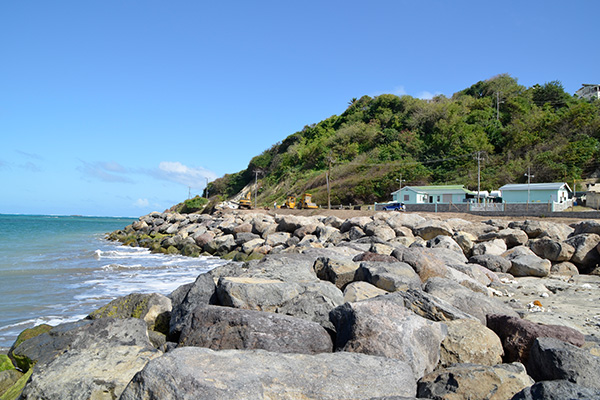OECS and USAID unveil sea defense before hundreds in Petite Martinique
(OECS Secretariat, Castries Saint Lucia) The OECS Secretariat and USAID in a joint ceremony with the Ministry of Petite Martinique and Carriacou affairs brought the curtains down on restoration works undertaken to repair damage and rebuild sections of the northern coast of the small island of Petite Martinique.
These works were completed as part of a climate change intervention for the islands.
The ceremony held Thursday January 23rd, in Sanchez, Petite Martinique attracted over two hundred community persons, stakeholders, officials and other invited guests.
Speaking at the ceremony, Minister with responsibility for Petite Martinique and Carriacou affairs, Honourable Elvin Nimrod thanked the USAID for financing the works saying that the United States has always contributed comparatively large amounts of funds to Grenada for climate change adaptation and disaster recovery. “Our vulnerabilities to natural disasters are tremendous”, he continued “and while we cannot prevent disasters, we can focus on mitigating and building resilience against impacts with assistance from such partners as the United States.”
The total investment in these islands is valued at EC$1.75 million for this climate change intervention, with over EC$940,000 spent in Sanchez to restore a section of the northern coastline, reclaim land that was lost to the sea, and construct a 140 meter long sea revetment to prevent erosion of the playing field and other critical infrastructure in the area.
Placing these coastal restoration works in a regional context, Mr Bentley Browne, Director of Social and Sustainable Development of the OECS Secretariat in his remarks noted that the OECS Secretariat in 2012, instituted a climate change unit, whose responsibility it is to assist Member States with implementing an integrated response to climate change. “To date the OECS Secretariat has secured support from USAID, AUSAID and the European Union through a number of project grants to support activities under this climate change adaptation Programme. According to Browne, “available funding for this programme is currently estimated at just over EC$70 million.”
In this regard, Browne declared the OECS’ commitment to continued collaboration in “fighting the battle against climate change.” Although we cannot stop or reverse climate change, “What we need to do is minimize environmental vulnerability, improve environmental management and protect the region’s natural resource base, in order to increase our resilience to climate change impacts and allow continued social and economic benefits,” Browne posited.
Climate change issues such as warmer seas, rising sea temperatures, loss of coral reefs and disappearance of mangroves continue to impede the natural patrimony of small islands in the OECS, with the resultant damage to roads, livelihoods, and economies.
Ms Mikell O’Mealy, Eastern Caribbean Climate Change Advisor for USAID, in addressing the ceremony explained that the coastal restoration works in Petite Martinique benefits from U.S. President Barrack Obama’s Global Assistance Climate Change Programme which aids countries like those of the OECS to address negative impacts of climate change.
She applauded the collaborative effort employed in the region to deal with climate change impacts, saying, “What you’ve done here with this project demonstrates how climate change-induced erosion can be effectively addressed by combining technical expertise and a strong, collaborative community effort.”
“In addition to this project in Petite Martinique, USAID is funding ten other projects across the Eastern Caribbean and supporting the OECS Secretariat in helping us all learn from each other — learning together about what works best, what didn’t work so well, and how the most successful approaches can be scaled-up in each country and region-wide in the most cost effective way,” O’Mealy added.
U.S. Chargé d’Affaires to Grenada, Mr Louis Crishock in his remarks spoke of the pride and gratitude that the works had brought him, “I am proud, first of all, of the U.S. contribution, through USAID, that made this project possible. Grenadians know well that the government and people of the United States are ready to lend a helping hand in times of trouble. This will not change. Projects like the Sanchez revetment, demonstrate a hallmark of U.S. assistance today.”
The OECS-USAID Project (known as the RRACC Project), is valued at US$10.5 million, and has allocated approximately 60% of these funds to 11 demonstration projects, which are to provide strong examples that validate and showcase appropriate measures that can reduce risks from climate change.

